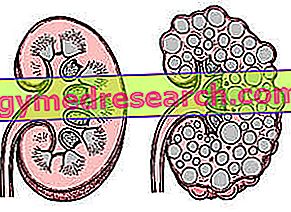Related articles: Cushing's disease
Definition
Cushing's disease is a disease characterized by an excess of cortisol in the body. In most cases, this condition is due to a hypersecretion of the adrenocorticotropic hormone (ACTH) secondary to a pituitary adenoma. ACTH targets the adrenal cortex, which is stimulated to produce excess cortisol. As a rule, cortisol regulates the body's responses to stress, glucose and lipid protein metabolism in different tissues, and plasma glucose levels.
Cushing's disease can also be caused by the presence of adenomas or adrenal carcinomas.
Most common symptoms and signs *
- Acne
- ageusia
- Changes in the menstrual cycle
- Amenorrhea
- Redness of the face
- Asthenia
- Weight gain
- Kidney stones
- Decline in sexual desire
- Depression
- Difficulty concentrating
- Erectile dysfunction
- Dismennorea
- Mood disorders
- Bruising
- Edema
- Ease of bleeding and bruising
- Bone fractures
- Galactorrhea
- Glycosuria
- Insomnia
- insulin Resistance
- Hyperglycemia
- Hypertension
- Intracranial hypertension
- Hypophosphatemia
- Hypokalemia
- Hirsutism
- Osteopenia
- Osteoporosis
- Dark skin
- Water retention
- Intense thirst
- Drowsiness
- Strie rubre
Further indications
The manifestations of Cushing's disease can be traced to chronically elevated blood levels of cortisol in the body. Typical symptoms include a rounded, reddened face (moon-shaped facies, in the shape of a full moon) and significant and sudden weight gain, concentrated mainly at the abdominal level. Excess fat is also evident around the neck, where the fat pads are prominent and create a small hump.
Furthermore, Cushing's disease is manifested by fatigue, loss of muscle tone and progressive thinning of arms and legs. The skin is thin and atrophic; moreover, it has easy appearance of bruises, poor healing power, excessive hair growth, reddish-purple striae at abdominal level (similar to "stretch marks") and acne. Other signs that appear in the case of Cushing's disease are: arterial hypertension, glucose intolerance, reduced resistance to infections and mental disorders, such as depression, irritability, sleep disorders and difficulty concentrating. Possible complications are osteoporosis with related fractures, kidney stones or cardiovascular problems.
Women usually have menstrual irregularities, while men can suffer from erectile dysfunction.
The diagnosis is based on hormonal dosages, in particular on the finding of elevated levels of ACTH and cortisol associated with the impossibility of suppressing their production with the administration of dexamethasone. The identification of the causes requires radiodiagnostic tests (CT, MRI with gadolinium and PET).
Treatment of Cushing's disease depends on the cause. The secreting ACTH adenomas are surgically removed or treated with radiotherapy. Some patients may undergo adrenalectomy (from one or both adrenal glands) or medical therapy (administration of anticortisolics).



